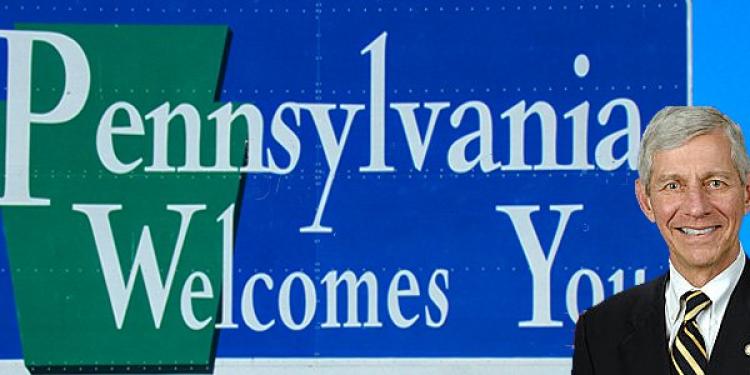State Senator Introduces Online Gambling Bill in Pennsylvania
Posted: June 18, 2014
Updated: October 4, 2017

Pennsylvania state Senator Edwin Erickson introduced new online gambling legislation bill to the state Senate.
The bill SB 1386 was promised in the beginning of June and is supported by Senator Bob Mensch, however there are certain ambiguities around it, mainly regarding the online gambling activities it covers.
Despite the fact that the preamble of the bill suggests focus on online poker, there are references in the draft to “any game” or activity authorized by the state gaming regulator, which means that supposedly the internet gambling spectrum covered can be much larger.
Additionally, the preamble explained that “the bill as introduced is little changed from a draft circulated earlier this month and given wide media exposure.”
The bill also allows for liquidity sharing with like-minded states and the license fees will be $5 million along with set tax rate of 14% of gross gaming revenue, which will be payable on a weekly basis.
There is also a commercially protective clause, which is even extended by the “bad actors” clause, aiming at excluding companies, which can be potential serious competition.
This section includes anyone who purchased or acquired a “covered asset” used to take bets from US residents after 31st December 2006, meaning that Amaya Gaming/PokerStars can’t partner with casino in Pennsylvania.
This bill was introduced after the completion of a gambling research in the state, which concluded that US online poker rooms can bring revenues of approximately $129 million/year in Pennsylvania.
Keeping in mind that the population of this state is twice as big as the one in New Jersey, which makes is the most probable new state to legalize online gambling and potentially develop great online poker business opportunities.
Some researchers even went further by pointing out that Pennsylvania-New Jersey partnership has potential to attract 7 times more players than combined number of players in Delaware and Nevada.
His research and analysis on the two online poker bills introduced in California earlier this year stated that these provisions “fly in the face” of the US Constitution’s prohibition on states passing bills of attainder.
Thus, this bill “legislatively determines guilt and inflicts punishment upon an identifiable individual without provision of the protections of a judicial trial,” otherwise known as “trial by legislature.”
The bill SB 1386 was promised in the beginning of June and is supported by Senator Bob Mensch, however there are certain ambiguities around it, mainly regarding the online gambling activities it covers.
Despite the fact that the preamble of the bill suggests focus on online poker, there are references in the draft to “any game” or activity authorized by the state gaming regulator, which means that supposedly the internet gambling spectrum covered can be much larger.
The controversy
The preamble said very clearly: “Developments in technology and recent legal decisions have created an opportunity to legalize interactive poker as a means to further enhance and complement the benefits delivered by casino gaming, licensed facilities and the communities in which they operate.”Additionally, the preamble explained that “the bill as introduced is little changed from a draft circulated earlier this month and given wide media exposure.”
The bill also allows for liquidity sharing with like-minded states and the license fees will be $5 million along with set tax rate of 14% of gross gaming revenue, which will be payable on a weekly basis.
Further details on the bill
Online casinos in America, which receive the license in question, would have to be confined to already licensed land-based operators and “not the brands of third parties.”Pennsylvania state Senator introduced online gambling billMoreover, the same branding must be used and “no site would be permitted to operate that is identified by a brand or name that is not owned or controlled by the licensee or an affiliate of the licensee.”
• There are certain controversies in the text
• Online poker is expected to bring immense profit to the state
• The “bad actors” clause may be unconstitutional
There is also a commercially protective clause, which is even extended by the “bad actors” clause, aiming at excluding companies, which can be potential serious competition.
This section includes anyone who purchased or acquired a “covered asset” used to take bets from US residents after 31st December 2006, meaning that Amaya Gaming/PokerStars can’t partner with casino in Pennsylvania.
This bill was introduced after the completion of a gambling research in the state, which concluded that US online poker rooms can bring revenues of approximately $129 million/year in Pennsylvania.
Keeping in mind that the population of this state is twice as big as the one in New Jersey, which makes is the most probable new state to legalize online gambling and potentially develop great online poker business opportunities.
Some researchers even went further by pointing out that Pennsylvania-New Jersey partnership has potential to attract 7 times more players than combined number of players in Delaware and Nevada.
”Bad actors” clause concerns
However, when it comes to the “bad actors” clause there are various examples of expressed concern. Namely when it was previously proposed in California, Laurence Tribe, Harvard Law School professor, claimed that it may be unconstitutional.His research and analysis on the two online poker bills introduced in California earlier this year stated that these provisions “fly in the face” of the US Constitution’s prohibition on states passing bills of attainder.
Thus, this bill “legislatively determines guilt and inflicts punishment upon an identifiable individual without provision of the protections of a judicial trial,” otherwise known as “trial by legislature.”
Related content
Subscribe
0 Comments












